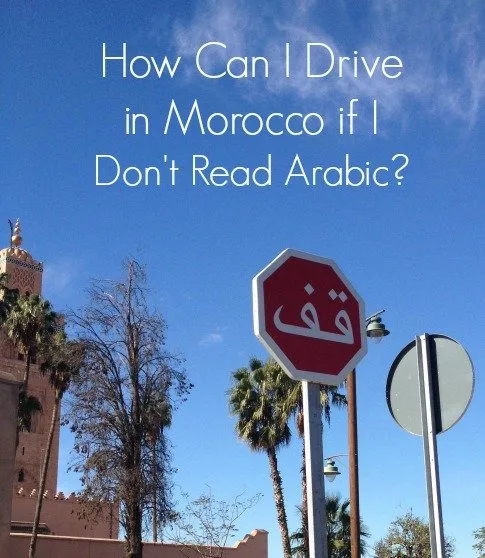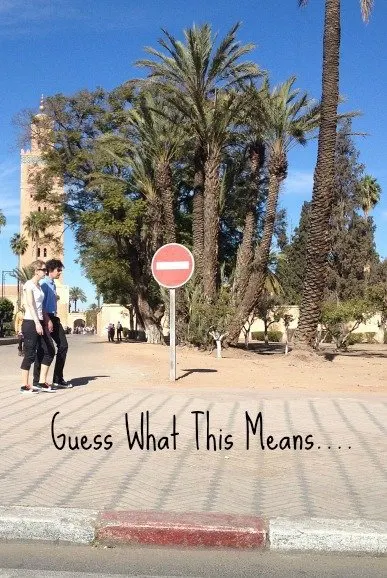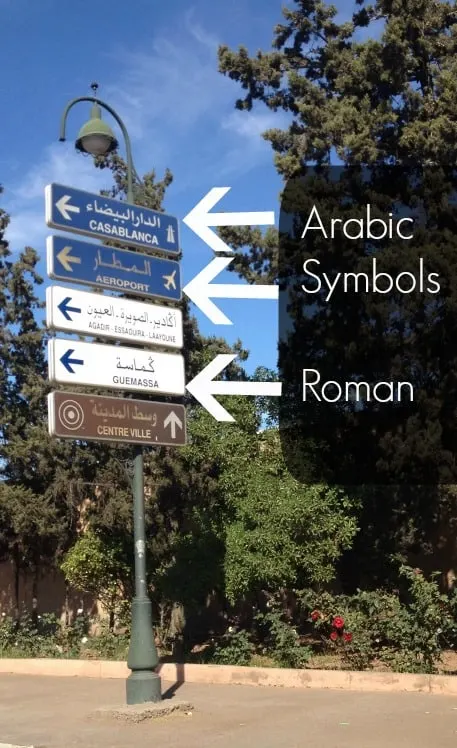Fact: I can’t read Arabic.
Next Question People Ask:
 Good question. The truth is I can’t read Arabic (unless you count my ability to read and find the words “Allah” and “Coca-Cola” two words that I see almost with the same regularity here). But Morocco, like Quebec and other bilingual locations has done an excellent job of making signs readable in Arabic and Roman letters. In some cases things are listed in 3, and sometimes 4 languages. All official buildings are now titled in Arabic, French, and Berber. But that still doesn’t really answer the driving question does it?
Good question. The truth is I can’t read Arabic (unless you count my ability to read and find the words “Allah” and “Coca-Cola” two words that I see almost with the same regularity here). But Morocco, like Quebec and other bilingual locations has done an excellent job of making signs readable in Arabic and Roman letters. In some cases things are listed in 3, and sometimes 4 languages. All official buildings are now titled in Arabic, French, and Berber. But that still doesn’t really answer the driving question does it?
Morocco, although quite developed- on par with many European countries on many aspects – still struggles with high illiteracy rates among the general population. In urban areas this is not as much a problem as rural areas. That being said what has struck me is that they (the officials in charge) have made clear decisions whether by necessity or choice, to make most everything including driving, possible for someone who can not read. Period.
Driving symbols are universal everywhere.
A stop sign is always going to have the same color and shape.
The color of street lights (red, yellow, green) are the same.
Yield signs are represented by triangles and so on.
Something a bit different here is that there are no real street name signs, which can be a gigantic, and by gigantic I mean gigantic headache. Instead places are known by landmarks. This is such a reality that if you ask for street names most people have no clue where you’re talking about. Oh and forget about GPS. 9 times out of 10 it’s wrong.
When I first started learning Darija one of our first lessons was on directions, both giving and receiving them. The ability to understand where you’re going is critical. I learned where I live by the name of the neighborhood it’s in, and then the nearby landmarks. If I told someone my actual street name, no idea.
But if you can’t read, isn’t there some bad feelings attached? Shame? I know that for the first time in my life, I am functionally illiterate here – and I am ashamed. I feel very distressed that I can’t read subtitles, the newspaper headlines, or a simple note from children’s teacher. It’s true in other places I may not be able to understand everything in French, or Spanish but I can usually recognize enough to get the gist. I feel completely at a loss here and rely very heavily on my basic French skills. I had a bit of an end to my illiteracy pity party a few weeks ago. One day at the grocery market, I had a young woman ask me if I could tell her the price of an item. At first I wasn’t sure I’d heard correct but MarocBaba confirmed I had, so I proceeded to tell her. She thanked me and that was it. Part of me was a bit blown away that someone who was younger than me and born here, couldn’t read, or even find the numbers on the package. Older men and women also have high illiteracy rates in the country, but they’ve adapted. But younger generations? I really couldn’t believe it. It’s interesting to watch how older people have made their world work without reading or writing. Their grand kids help them read and send text messages and they sometimes develop symbols as a way to keep track of names and information. I used to feel a real sense of pity that they couldn’t pick up and enjoy a book or sit down and write. But they’ve made it work in their own ways and truthfully they tell some amazing stories (the storytelling culture is amazing) and have other types of memories that I only wish I could boast.
This whole transition has gotten me to think a lot about immigrants who move to the United States and can’t read English. How complicated have we made everyday life that we expect everyone to have a high literacy rate to preform basic tasks? I have to say if the same standard were applied here I’d be sunk. I wouldn’t be able to drive. Are there ways that we as literate people could still do our daily tasks with a more simplified system?
Road Signs are only half the battle. Here are some basic tips if you decide to drive in Morocco:
- Say a little prayer before taking off (I’m only half kidding here).
- Buckle up – you can pack 7 people in the backseat but if you’re in the front you’ve got to buckle.
- If you’re renting a car, take out the best insurance you can to protect yourself.
- There’s a lot of round-abouts, make sure you follow them, even the tiny little ones that you can barely see on the ground.
- Keep a bit to the left, don’t drive too close to the right shoulder in cities. Bikes, motorcycles, donkey carts etc use that space.
- Lines on the road are sort of guidelines, not fixed. It’s pretty common to see more than 2 cars wide on a 4 lane road.
- Likewise if you’re in the right lane and wanting to turn left (and there’s cars to your left) fear not. There’s really no rules about being in one lane or another to turn. This is a bit of nightmare if you’re being cut off, but great if you forgot to switch lanes and need to turn.
- A blinking green light = a yield light. Slow down or stop.
- No right turns on red.
- Police still direct traffic in busy cities here. Especially on the round abouts. They’re pretty good about telling you what to do. When you see an officer, you can mostly disregard the street light and follow his directions to stay put or move.
- If you’re lost, the best people to ask for help are guardians. These are the guys who watch parked cars and motorcycles. You’ll find them just about anywhere cars are parked, and usually wear a bright colored vest. I’ve found police officers to be less helpful but if you look like a lost tourist their tune might change.
- Get pulled over? Best bet is to feign ignorance and apologize. They’ll probably let you go.
- There was a time when bribing a police officer would get you off the hook. Not so much anymore.
That’s all I could think of for now but I’ll be sure to update this if I think of others.

Sisay Solomon
Saturday 14th of March 2020
Hi goood morning do you can help me i need driving lisece ethiopia convert morroco thank you driving learn scool aderess
Amanda Mouttaki
Saturday 14th of March 2020
Chances are you'll need to start from the beginning. There are a lot of driving schools in every city. Find one close to you and ask around to find the best rates offered. They should help you to do the driving requirements and tell you how to sign up and do the written portion.
Jewel Ahmed
Tuesday 17th of December 2019
Thank you for sharing.
Jonathan Ervine
Monday 3rd of March 2014
This was a really interesting post. Living in North Wales, I'm used to seeing road signs that are in Welsh and English (generally with the Welsh first). Now that I'm more or less fluent in Welsh, I think that I process the information more quickly on the ones that just have text (e.g. temporary signs about road works).
Ezzy Guerrero-Languzzi
Wednesday 15th of January 2014
Amanda, you are one tough cookie, because if it were me, I'd never leave the house! And I get lost WITH signs I can read. You're experiences have been amazing and inspiring to follow. You make a good point about how difficult parts of the U.S. make it for immigrants who are learning the language. Most Americans would never survive if the tables were turned.
Amanda Mouttaki
Sunday 19th of January 2014
Thank you Ezzy - you know this is one thing I honestly didn't even think about before we moved. Thankfully I am pretty good with directions and remembering routes so that has been very helpful. But knowing I would struggle to ask for help if I were lost is more intimidating. It's totally changed my outlook about how things are conducted in the US and the unnecessary language barriers we put up.
Mrs. Chasing the Donkey
Friday 10th of January 2014
How hillarious - I could neverrrrrrr do this.
Amanda Mouttaki
Sunday 19th of January 2014
The first few times I was white-knuckled. Now I'm a little more comfortable.